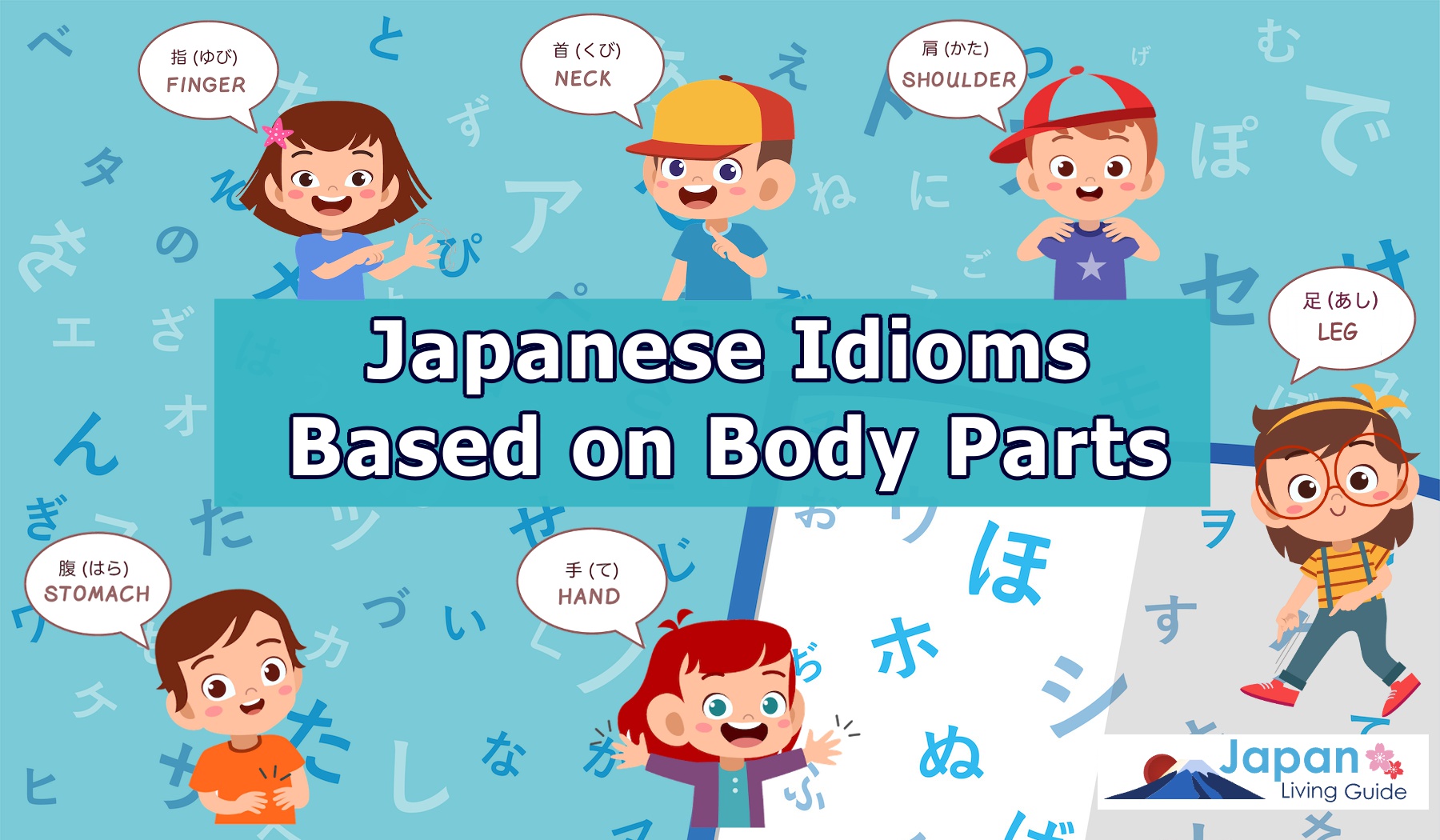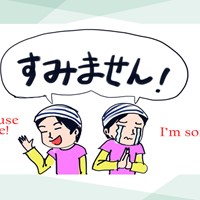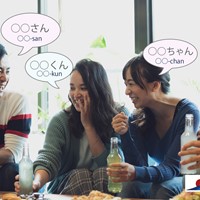Japanese Idioms: A List of Expressions Based on Body Parts

This page contains affiliate links.
When learning a language one of the most difficult, yet most interesting aspects is mastering the idioms and expressions that come with the language. From literal meanings that are seemingly completely at odds with metaphorical meanings to confusing colloquialisms, learning idioms can be an uphill battle. However, becoming aware of these expressions and being able to use them is a rewarding and motivating experience. Below we cover the most popular idioms related to body parts.
If you’re looking to dive deeper into Japanese idioms and expressions, check out Japanese Language Schools in Tokyo for courses that can help you learn them in context.
Learn Japanese online with Japonin! Flexible lessons, experienced teachers, and a fun way to improve your Japanese anytime, anywhere.
Learn Japanese with Japonin
Flexible lessons, experienced teachers, and a fun way to improve your Japanese anytime, anywhere. >> More details: Japonin
Head Expressions (頭)

Atama ga agaranai (頭が上がらない)
Atama ga agaranai, or “the head can’t rise,” is an expression used to indicate a relationship where the speaker feels they are unable to be equal with the other person. They feel they are always outclassed or outperformed, whether this be in authority, strength, or results.
Atama ga katai (頭がかたい)
This expression is used to describe a person who is inflexible, refusing to change their mind and stubborn about a situation. With a literal meaning of “hard-headed,” it is read atama ga katai.
Face Expressions (顔)

Awaseru kao ga nai (合わせる顔がない)
Awaseru kao ga nai, or “there is no matching face,” is an expression used to convey a sense of shame. It refers to a situation in which one feels too embarrassed or ashamed to meet someone.
Ôkina kao wo suru (大きな顔をする)
“To put on a big face” is similar to the English expression “to act big,” meaning to act important. It is read ôkina kao wo suru.
Kaoiro wo ukagau (顔色をうかがう)
The expression kaoiro wo ukagau has a similar literal and metaphorical meaning. The literal meaning is “to examine someone’s complexion/face” while the metaphorical meaning is “to gauge someone’s feelings.” Considering one aspect of understanding feelings is done through facial expressions, the link between the meanings is very clear.
Kao ga kiku (顔が利く)
When describing someone with a lot of influence and popularity you might use the term kao ga kiku. This expression literally means “to have a good or effective face” and is used to describe influential people.
Kao ga tsubureru (顔が潰れる)
Read as kao ga tsubureru, with a literal meaning of “the face is squashed,” this expression has a similar meaning to the English expression “to lose face”. When one’s integrity or credibility is injured, this expression could be used.
Kao ni doro wo nuru (顔に泥を塗る)
The expression “to put mud on one’s face” describes a situation where the speaker has brought disgrace or shame upon themselves. It is read kao ni doro wo nuru.
Kao ga hiroi (顔が広い)
Kao ga hiroi, or “to have a wide face” is a common expression referring to people who are well-connected or have a wide range of acquaintances. It could be compared to the English expression of being “widely known”.
Eye Expressions (目)

Shiroi me de miru (白い目で見る)
The expression shiroi me de miru, or “to look with white eyes,” is often used to describe looking coldly or frowning directly at someone in a malicious way.
Me ga kiku (目が利く)
This expression is almost identical to the English equivalent “to have an eye for something,” meaning to be good at understanding or distinguishing value in something. The Japanese version, read me ga kiku, literally means “to have an effective eye.”
Me ga koeru (目が肥える)
This expression is similar to the previous one, but differs in that the “good eye” comes from experience of seeing “good things” (such as art, cuisine, and the like) previously. Read me ga koeru, the literal meaning is that the “eye grows fat.”
Me ni irete mo itakunai (目に入れても痛くない)
Read me ni irete mo itakunai, this expression has the literal meaning of “it doesn’t hurt even if you put it in my eye.” This may be confusing as the metaphorical meaning is that something or someone is so cute or irresistible you don’t know what to do. It would be used to describe someone or something you love very much.
Me wo sara no yo ni suru (目を皿のようにする)
To be wide-eyed in surprise, confusion, or even looking for something, we can use the expression me wo sara no yo ni suru. This has the literal meaning “to make your eyes look like plates.”
Nose Expressions (鼻)

Hana de ashirau (鼻であしらう)
The phrase hana de ashirau is used to describe treating someone with contempt or snubbing someone. It has the literal meaning “to respond with the nose” and could be considered similar to the English expression “to turn up one’s nose”.
Hana ni kakeru (鼻にかける)
Hana ni kakeru has the literal meaning “to put on the nose” and is often used to describe someone who is overly prideful or boasting.
Ear Expressions (耳)

Mimi ga itai (耳が痛い)
“The ears hurt” is an expression used to describe a remark that is painfully true. It is read mimi ga itai and is used to refer to a comment that has hit home and is quite hurtful.
Mimi ni tako ga dekiru (耳にたこができる)
The phrase mimi ni tako ga dekiru has a literal meaning of “getting calluses on the ears.” It refers to a situation where one has heard the same thing too many times and is weary of hearing it so often.
Mimi wo soroeru (耳をそろえる)
If you have to collect enough money to pay off a debt, it can also be referred to as “collecting one’s ears.” This is read as mimi wo soroeru.
Mouth Expressions (口)

Kuchi ga karui (口が軽い)
This expression, “light-mouthed,” read as kuchi ga karui, describes someone who is talkative without thinking. They are unable to keep a secret and often say things they shouldn’t have said.
Kuchi ga katai (口がかたい)
This expression is the direct opposite of the previous one, both in meaning and word usage. To describe someone as “hard-mouthed” or kuchi ga katai, says they are able to keep a secret and are good at keeping their mouth shut when need be.
Kuchi ga omoi (口が重い)
Kuchi ga omoi, or “heavy-mouthed” differs from the above expression in that it describes someone who is incommunicative and taciturn, or someone who uses few words.
Kuchi kara saki ni umareru (口から先に生まれる)
“To be born from the mouth” describes a person who is very chatty and enjoys talking. They like to converse with anyone and everyone. The expression is read kuchi kara saki ni umareru.
Kuchiguruma ni noru (口車に乗る)
The expression kuchiguruma ni noru means “to get on or to follow someone’s smooth talk.” The metaphorical meaning is very close to this and describes being taken in or deceived by someone with honeyed words or glib talk.
Kuchi wo hasamu (口をはさむ)
To interrupt someone while they are speaking calls for the expression kuchi wo hasamu, or “to pinch one’s mouth.”
Neck and Throat Expressions (首・のど)

Kubi wo tsukkomu (首をつっこむ)
The expression kubi wo tsukkomu has a literal meaning of “to stick out one’s neck,” but metaphorically correlates to a different body part expression in English. While in English one might say “to poke your nose into someone’s business” to convey prying or interfering, Japanese uses “to stick/push your neck out.”
Kubi wo nagaku suru (首を長くする)
Kubi wo nagaku suru, or to elongate one’s neck, refers to a situation that the speaker is looking forward to or excited about. If you imagine stretching your neck closer to something you want to see, you can understand the logic behind this expression.
Nodo kara te ga deru (喉から手が出る)
If you desperately want something, you could use the expression nodo kara te ga deru, or “the hand comes out from the throat.” While this may sound strange, the origin story is based around a time of famine and starvation, where people wanted to eat so desperately that eating utensils were ignored.
Chest and Abdomen Expressions (胸・腹)

Hara ga kuroi (腹が黒い)
Hara ga kuroi literally means “the stomach is black.” It refers to scheming and having “evil thoughts,” similar to how one might refer to a “black heart” in English.
Hara no mushi ga osamaranai (腹の虫が治まらない)
This expression could be used to describe a situation in which you could not contain your anger. Such out-of-control anger is described as hara no mushi ga osamaranai, or “the insect in my stomach won’t settle.”
Mune ni kizamu(胸に刻む)
Mune ni kizamu, or “to carve into one’s chest,” has an easily understood meaning of something or someone that you will never forget; they are etched into your memory.
Mune wo nadeorosu (胸をなで下ろす)
When you are feeling relieved after an anxious or stressful situation, you may want to use mune wo nadeorosu. Literally, this means “to stroke down the chest.” This is another easily understood expression. Stroking an animal to comfort it comes as second nature, so the metaphorical idea of stroking your heart (chest) to relieve anxiety is quite logical.
Mune wo haru (胸を張る)
The expression mune wo haru, or “to spread one’s chest,” is similar in both literal and symbolic meaning to its English equivalent. This expression means to be very proud, or in some cases overly proud.
Shoulders and Arms Expressions (肩・腕)

Kata no ni ga oriru (肩の荷が下りる)
The English expression “to take a weight off one’s mind,” meaning to be relieved of a burden or responsibility, is very similar to its Japanese equivalent, varying only in body part. The Japanese version, kata no ni ga oriru, means “take down the weight of one’s shoulders” and is a clear equivalent to the English expression.
Katami ga semai (肩身が狭い)
Katami ga semai, or “the shoulders are narrow,” has the metaphorical meaning of feeling ashamed or embarrassed. It is often used in a situation where the speaker feels inferior to others.
Kata wo otosu (肩を落とす)
The expression “to drop one’s shoulders” is read as kata wo otosu. The meaning is to feel discouraged and down. It may refer to feeling discouraged about a certain project or just a general feeling.
Kata wo motsu (肩を持つ)
In English, we often use the expression “to have someone’s back,” meaning to support or be reliable for someone. In Japanese, the expression “to have someone’s shoulders,” read kata wo motsu, has the same meaning.
Ude wo migaku (腕を磨く)
If you are trying to improve your skills and abilities, you might find yourself using the expression ude wo migaku. This translates literally as “to polish one’s arm,” but more metaphorically means to polish your skills and work on improving yourself.
Hands and Fingers (手・指)

Kayui tokoro ni te ga todoku (かゆいところに手が届く)
Here we have the expression kayui tokoro ni te ga todoku, with the literal meaning “to reach the itchy area.” The more metaphorical meaning is to be focused on fine details. A person who is able to pay attention to all details and make sure even small tasks are completed correctly may be described with this expression.
Ushiro yubi wo sasareru (後ろ指を指される)
Ushiro yubi wo sasareru, or “to have fingers pointed at one’s back,” is an expression referring to a situation in which others are talking about you behind your back. This is usually a negative thing involving criticism or accusations.
Te no hira wo kaesu (手のひらを返す)
To flip-flop or do an about-face is often described with the expression te no hira wo kaesu. This has the literal meaning of “to turn over the palm of one’s hand,” a representation of turning over your decisions or opinions.
Te wo nuku (手を抜く)
The phrase te wo nuku has the literal meaning of “to pull out one’s hand.” It is used in a similar way to the English expression “cutting corners,” meaning to skip aspects of work that should be done or to relax on the job.
Te wo yaku (手を焼く)
“To burn one’s hands,” read as te wo yaku, describes a difficult situation. It may be a situation you can’t cope with, are unsure what to do, or feel it is out of your control.
Yubi wo kuwaeru (指をくわえる)
When in a situation where you are envious of someone or something but unable to do anything about it, you may want to use the expression “to hold your fingers in your mouth” or yubi wo kuwaeru.
Lower Back and Buttocks Expressions (腰・尻)

Koshi ga hikui (腰が低い)
This expression, read koshi ga hikui, means “to have a low/short back.” However, its idiomatic meaning is used to describe a person who is humble and modest.
Koshi wo sueru (腰を据える)
“Lower the waist,” or koshi wo sueru, refers to a situation in which you might have to take things calmly and move forward slowly but surely. It conveys a sense of being settled and calm.
Koshi wo nukasu (腰をぬかす)
This expression, read koshi wo nukasu, can seem confusing at first but soon makes clear sense. The literal meaning is “to pull out or dislocate one’s back,” but the metaphorical meaning is “to be very surprised.” The etymology relates to being so surprised that you lose strength and can’t stand up, similar to how you might feel with a dislocated back.
Shiri ni hi ga tsuku (尻に火がつく)
Shiri ni hi ga tsuku is an expression that literally means “the buttocks catch fire.” It is used in a situation where the situation is imminent and the speaker is pressed by urgent matters. They are so pressed for time that they might be running around like their pants are on fire, hence the expression.
Feet Expressions (足)

Ashi ga omoi (足が重い)
“To be heavy-footed” refers to a feeling of not wanting to go, but needing to go. It describes a sense of reluctance. The expression is read ashi ga omoi.
Ashi ga bo ni naru (足が棒になる)
Ashi ga bo ni naru, or “the legs have become rods,” describes a feeling when one’s legs have become stiff and tired. This is usually after standing or walking for a long time.
Ashimoto wo miru (足元を見る)
The expression ashimoto wo miru has the meaning “to look underfoot.” However, the more metaphorical meaning is to “take advantage of someone’s weaknesses” in an unfair way.
Other Expressions

Ago de tsukau (あごで使う)
“To use with one’s chin” is an expression used to describe treating someone in an arrogant fashion or pushing someone around. It is read ago de tsukau.
Ha ga tatanai (歯が立たない)
Ha ga tatanai has the literal meaning of “teeth can’t stand” but is used metaphorically to refer to a situation in which one is completely unable to compete or make progress at all. It describes a problem or opponent that is insurmountable.
Hone wo oru (骨を折る)
The expression “to break one’s bones” describes a person’s strong efforts to deal with a situation. It could be likened to the English expression “bone-breaking labor,” although it has a less intense feeling. It is read hone wo oru.
Heso wo mageru (へそを曲げる)
Heso wo mageru, or “to bend the belly button,” is often used in a similar way to the English expression “to get bent out of shape”. It describes creating a bad mood or ruining someone’s mood.
















